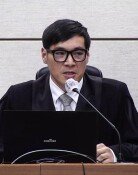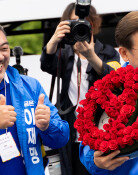Individual Claims Not Covered by 1965 Treaty: Documents
Individual Claims Not Covered by 1965 Treaty: Documents
Posted March. 15, 2010 09:29,
Japan said the 1965 bilateral treaty normalizing ties with Korea did not cover individual compensation claims from victims of forced labor under Japanese colonial rule, documents released yesterday said.
The Japanese Foreign Ministry prepared an internal document in 1965 saying, Though a treaty was signed, an individuals right to seek damages is a separate issue.
The treaty contained a clause that the rights of the two countries and individuals to seek damages were settled under the condition that both sides agree on Japanese economic aid to Korea. The clause served as the grounds for cancellation of a former forced laborer to seek damages from the Japanese government.
The disclosure of the new clause in the document, however, will likely rekindle debate over an individuals right to seek damages.
The document was titled The legal meaning of the peoples rights and the waiver of the rights to seek damages under the peace treaty.
When an individuals property rights (private rights) in a country is infringed upon by another country, the former country holds the right to seek damages from the latter country, but this right is legally separate from the individuals own right to seek damages, the document said.
Another document titled Article 2 of the Japan-Korea Treaty, and the detention of fishing boats said, The meaning of Article 2 in the treaty constitutes a promise that a country does not exercise the right to diplomatic protection, a sovereign national right recognized under international law, but this does not mean that individuals have no right to seek damages from the other country.
This implies that a country can exercise the right to seek compensation for damage inflicted on its citizens at the national level, but does not mean an individual cannot seek damages.
The document from the Japanese Foreign Ministry was made public in 2008 after a Japanese civic group on the complete disclosure of documents on the 1965 treaty demanded Tokyo release the information.
The 60,000 pages of documents drew attention because of clauses on Koreas easternmost islets of Dokdo, which Japan had claimed.
The documents, however, were found to possess another significant implication by lawyers in the course of a lawsuit against the Japanese government and the military contractor Fujikoshi, which was filed by former forced laborers during the Second World War.
As a result, the lawyers, who lost a trial in a lower court in 2003, asserted the validity of an individuals right to seek damages based on clauses in the document at a trial before the Nagoya high court Monday last week.
The court, however, upheld the lower court ruling that all the rights of Korean individuals to seek damages had expired due to the Korea-Japan treaty.
changkim@donga.com



![[단독]용산 근무 보수청년단체 회장 “대북 무인기 내가 날렸다”](https://dimg.donga.com/c/138/175/90/1/wps/NEWS/IMAGE/2026/01/16/133175554.1.jpg)



